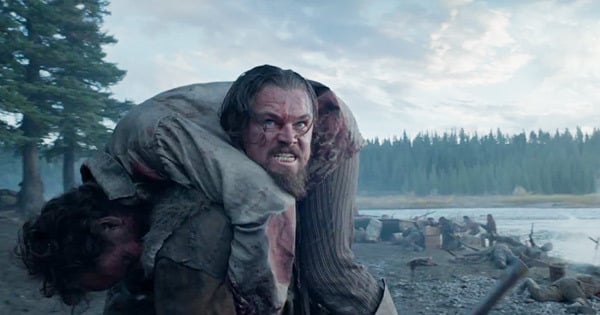Anyone can CGI a merman. Guillermo del Toro builds the dang rubber suit.
That kind of personal touch from the renowned cowriter/director - leaving one's fingerprints on the final product instead of outsourcing it - is emblematic of all that makes "The Shape Of Water" special. A movie not afraid to be brazenly grotesque in one beat and brazenly corny in another, it exudes a tactile love for the magical possibilities of cinema, wearing its heart on its sleeve. And like movies as varied as "E.T.," "Singin' In The Rain," and "Titanic," it taps into something primal and urgent, the belief that we're special and our desire for someone else who sees us that way.
The time is the Cold War, circa 1962. The place is a mysterious government research lab in Baltimore. A mute custodian (Sally Hawkins, never more enchanting) dutifully mops its floors every night, after a regular and rigorous masturbation session in her apartment's bathtub. Her only two friends are a fellow janitor (Octavia Spencer) and a closeted gay artist living next door (Richard Jenkins).
One night, a colonel (Michael Shannon) suddenly arrives with some merman-type creature captured in the South American jungle ("worshiped like a god" by the locals, we're told). He's got marching orders to study the creature and eventually destroy it, but Hawkins secretly forms a friendship and eventual romance with it, partially through their shared outsider status, but also through universal decency. With the aid of Spencer, Jenkins, and an empathetic Soviet spy (Michael Stuhlbarg) posing as a scientist at the lab, Hawkins hatches a plan to free the creature and release it to the ocean.
Why set "The Shape Of Water" in the Cold War, when a few cosmetic changes could so easily transfer it to the present? Part of it boils down to the movie's fairy tale structure, where something happening a long time ago comes with the territory. There's also the inherent sci-fi elements, monsters and secret labs, that meld so well with the era of G-men in skinny ties.
But there's something deeper, something fundamental, that which lends the movie its power. A corrosive meanness pumps through the undercurrent of "The Shape Of Water, which practically everyone in the movie either actively engages in or implicitly allows while kicking up their feet. We hang a drape over the magical. We slap down those who threaten to speak up.
By setting his movie in the Cold War and surrounding his mute protagonist with a black woman and a closeted homosexual, del Toro focuses on three people in a world where they don't have a voice. And when they fight back, they do so not with violence or hate, but with base human kindness. They gaze upon a creature sent from the gods and say that it deserves a place here too.
Much is made in "The Shape Of Water" of the past versus the future, and it's as if del Toro is saying this is where we start as a society, but this is also where we could be. He casts a warm lens on the world, blending moments of grace, tenderness, terror, and hope with aplomb.
Just as "The Shape Of Water" is a B-level monster movie, it's also, as mentioned, a fairy tale, and you can feel the glee of production designer Paul D. Austerberry as he's given the task to merge the two. In one scene, an advertising executive explains to Jenkins how green is the future, and true to the movie's heart, Austerberry bathes Hawkins' apartment in the color, suggesting it's her generosity of spirit that will ultimately act as our beacon. A visit to Shannon's traditional family home, on the other hand, casts it in drab yellows and browns, ensconced firmly in the past.
Meanwhile, del Toro and cinematographer Dan Laustsen walk a fine line between the mundane and fantastical, between drab and cinematic. By opting for the flat aspect ratio, they seem to purposefully reign in the scope of the movie even as wondrous sights unfold. Our world holds such beauty, even as others attempt to box it in.
That's not to say they don't also indulge in flights of fancy. Jenkins and Hawkins live above a movie house, and the magic of cinema permeates through "The Shape Of Water," such as an ethereal underwater sex scene between Hawkins and the creature where time seems to stand still and a brief black-and-white dream sequence that I won't spoil except to say you'll either roll your eyes or stand up and cheer.
Personally, I don't have much patience for those who would do the former.
As the mute janitor with only her face to do the talking, Hawkins embodies this kind of wanton open-heartedness. She throws herself into the role with gusto, capping scenes with quick dance steps or a glimmer in her eyes that stay just this side of twee, instead radiating a woman who's all life and love and won't give up the only creature in this world who sees those sides of her. It's a marvelous, incandescent performance.
"The Shape Of Water" stumbles only slightly in the last act as the chase between Shannon and Hawkins takes over and it becomes a typical race against time. But by the end, I didn't care. This is easily the best of all del Toro's English language movies, doing so many things that it's a bit stunning to look back and realize how many of them it did so superbly.
Lyrical and lovely, macabre and moving, "The Shape Of Water" transcends in ways that only cinema can. It grants outsiders the dignity that comes from being outsiders. It gives us hope in the better angels within ourselves. It's a work of utter magic.






